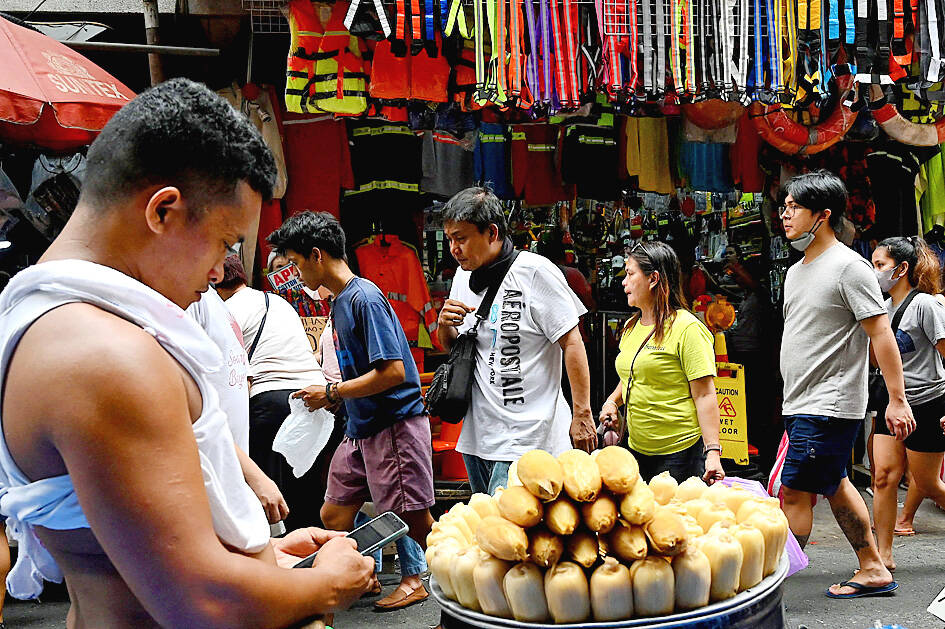The Philippines’ economy grew more than expected in the first three months of the year, official data showed yesterday, although the pace was the slowest in two years as soaring inflation and interest rate hikes crimped consumer spending.
The 6.4 percent expansion in the first three months was well down from the revised 7.1 percent enjoyed in the final quarter of last year, which analysts said could give the country’s central bank some room to step back from its monetary tightening drive.
Expectations were for 6.2 percent growth.

Photo: AFP
Philippine Socioeconomic Planning Secretary Arsenio Balisacan said the lower print was partly due to high inflation and last year’s rate hikes, which reined in consumer spending.
“Higher interest rates last year could have impacted on the consumption and investment already this year,” Balisacan said.
Consumer spending slowed to 6.3 percent in the first quarter, down from 10 percent during the same period last year.
The Philippine central bank raised interest rates several times last year to rein in inflation, which hit its highest level in more than a decade.
“Perhaps we are starting to feel that because there are usually some lag effects,” Balisacan said.
Balisacan said the government remained “confident” that it would hit its 6 to 7 percent economic growth target this year, despite headwinds.
The government expects that to pick up pace through 2028, to hit 6.5 to 8 percent.
“High inflation remains a challenge ... but the improvement in [the] business climate can counter this unintended effect,” he said.
Balisacan said the ongoing conflict between Ukraine and Russia as well as tensions in the South China Sea and the Taiwan Strait were among the risks to the growth outlook.

When an apartment comes up for rent in Germany’s big cities, hundreds of prospective tenants often queue down the street to view it, but the acute shortage of affordable housing is getting scant attention ahead of today’s snap general election. “Housing is one of the main problems for people, but nobody talks about it, nobody takes it seriously,” said Andreas Ibel, president of Build Europe, an association representing housing developers. Migration and the sluggish economy top the list of voters’ concerns, but analysts say housing policy fails to break through as returns on investment take time to register, making the

‘SILVER LINING’: Although the news caused TSMC to fall on the local market, an analyst said that as tariffs are not set to go into effect until April, there is still time for negotiations US President Donald Trump on Tuesday said that he would likely impose tariffs on semiconductor, automobile and pharmaceutical imports of about 25 percent, with an announcement coming as soon as April 2 in a move that would represent a dramatic widening of the US leader’s trade war. “I probably will tell you that on April 2, but it’ll be in the neighborhood of 25 percent,” Trump told reporters at his Mar-a-Lago club when asked about his plan for auto tariffs. Asked about similar levies on pharmaceutical drugs and semiconductors, the president said that “it’ll be 25 percent and higher, and it’ll

NOT TO WORRY: Some people are concerned funds might continue moving out of the country, but the central bank said financial account outflows are not unusual in Taiwan Taiwan’s outbound investments hit a new high last year due to investments made by contract chipmaker Taiwan Semiconductor Manufacturing Co (TSMC, 台積電) and other major manufacturers to boost global expansion, the central bank said on Thursday. The net increase in outbound investments last year reached a record US$21.05 billion, while the net increase in outbound investments by Taiwanese residents reached a record US$31.98 billion, central bank data showed. Chen Fei-wen (陳斐紋), deputy director of the central bank’s Department of Economic Research, said the increase was largely due to TSMC’s efforts to expand production in the US and Japan. Investments by Vanguard International

WARNING SHOT: The US president has threatened to impose 25 percent tariffs on all imported vehicles, and similar or higher duties on pharmaceuticals and semiconductors US President Donald Trump on Wednesday suggested that a trade deal with China was “possible” — a key target in the US leader’s tariffs policy. The US in 2020 had already agreed to “a great trade deal with China” and a new deal was “possible,” Trump said. Trump said he expected Chinese President Xi Jinping (習近平) to visit the US, without giving a timeline for his trip. Trump also said that he was talking to China about TikTok, as the US seeks to broker a sale of the popular app owned by Chinese firm ByteDance Ltd (字節跳動). Trump last week said that he had